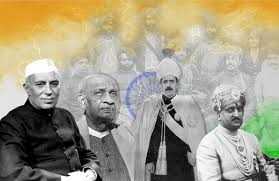
18-Sep-2024 , Updated on 9/18/2024 10:25:40 PM
Sardar Vallabhbhai Patel believed in unity whereas Gandhi and Nehru not, Why?
One of the worst blunders of India was that everything would have been different if Sardar Patel had become the first Prime Minister of India.
It will be more instructive to look into the whole saga of the power struggle within the Congress that happened on the eve of independence. We shall also attempt an assessment of what indeed had gone in Jawahar Lal Nehru’s favour and what went against Sardar Patel that the latter ought to have gotten a far superior support within the spectrum of the Congress.He was known as an effective organiser and a no-nonsense politician; it is thus not surprising that Sardar Patel enjoyed the unanimous support of the whole Congress membership to become the first Prime Minister of India. Then what actually turned sour? If one wants to know the answer, he or she has to go as far back as 1946.
29 April 1946 was the last date fixed for the election of the President of the Congress for the position that would create the first Prime Minister of India.
Whereas Sardar Vallabh Bhai Patel had been nominated by 12 of the 15 Congress committees. Hence, none of the three Congress committees that went remained proposed anyone’s name. Thus, one could easily see that Sardar Patel had the people on his side.
Gandhi, who was not happy, did as Nehru asked and directed Sardar Patel to remove his name after the request was made. Sardar Patel had enormous admiration for Gandhi, which shows that as soon as he nominated himself for the leadership, he withdrew this nomination. Moreover, it paved the way for Pandit Jawahar Lal Nehru to become Prime Minister of India, the first in an independent India.
Dr. Rajendra Prasad regretted the withdrawal of Sardar Patel; the latter betrayed his reliable right hand man again by Gandhi in favour of the “charming Nehru. ”
Of course, Gandhi had always pampered Nehru, as he demonstrated, at least twice before 1946, that he preferred Nehru instead of Sardar Patel for the presidency of the Congress. It took place in 1929 as well as in 1937.
According to Gandhi, Nehru was providing a modern vision as a prime minister of India, which always impressed him. Sardar Patel was a little more orthodox than Nehru, and Gandhi felt that India required a man with a more modern-age vision.
Finally, Gandhi was very sure that Sardar Patel would never go against him. He was not quite sure with Nehru. When Nehru told Gandhi categorically that he would not accept second place to anyone
This is the reason; Gandhi could have wished Patel and Nehru to rule over the nation. Due to his opinion that if Nehru was not to be made prime minister, he would raise matters that would only further prolong India’s independence, he used his veto power in favour of Nehru.
Some commentators viewed that Nehru insisted on the division of the Congress party if he is not made the prime minister.
Some of these analysts explaining Nehru’s ascendancy argue that the latter compelled Gandhi to support him by threatening to scuttle the entire independence plan in case of Congress division. The British would then have a justification for postponing independence by arguing over who should take the reins of power: the Congress with Nehru or the Congress without Nehru, and that was the reason why the die hard loyalists of the Congress.
Gandhi must have thought with his power seeking Nehru that it is beter to put pressure on Sardar Patel and make him a sacrifice. He had said that, all of a sudden, Nehru had gone out of his mind.
One is compelled to think whether Patel’s quest for basic unity was stifled at all by the ideas of Gandhi and Nehru, who came with a different set of ideologies altogether. Critics may argue that perhaps, more so in a country as diverse as India, supporters may disagree with Gandhi’s focus on moral reasons and Nehru’s focus on our freedom. Despite this, their thoughts were sometimes ambiguous, with the idea that the ‘lively’ power of a group is less significant than the liberty of a solitary person.

Student
hey there! i am a student currently pursuing my bachelors with a keen interest in writing., I am fueled by a deep love for storytelling and a flair for creating captivating narratives. Armed with a passion for language and a keen eye for detail, I strive to craft compelling copy that leaves a lasting impact.
Join Our Newsletter
Subscribe to our newsletter to receive emails about new views posts, releases and updates.
Copyright 2010 - 2026 MindStick Software Pvt. Ltd. All Rights Reserved Privacy Policy | Terms & Conditions | Cookie Policy